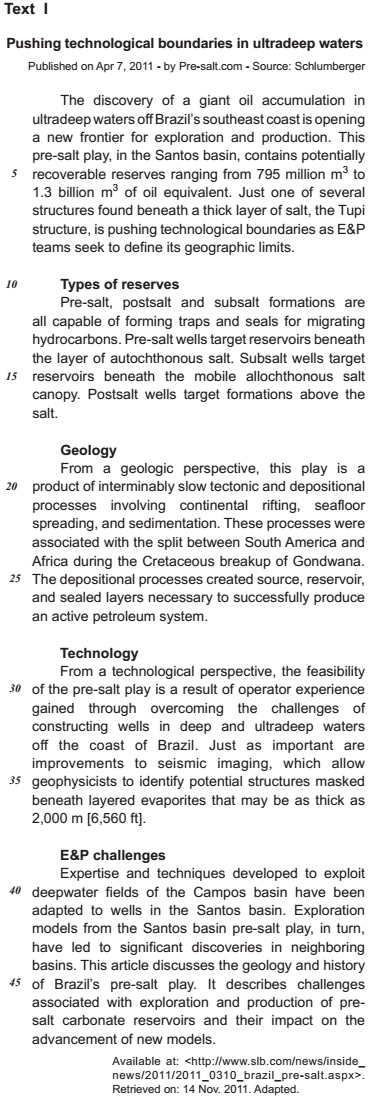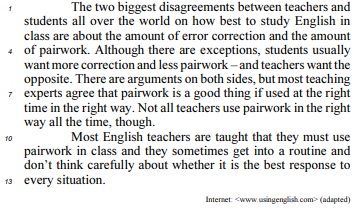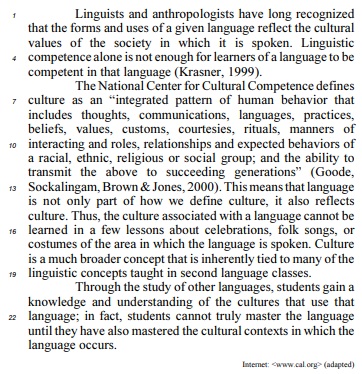Questões de Concurso
Sobre sinônimos | synonyms em inglês
Foram encontradas 1.378 questões
Making Performance Budgeting Work: New IMF Book
October 04, 2007
Member countries will find valuable advice on how to reform their budgeting practices to improve the effectiveness and
efficiency of public expenditure in a major new work on performance budgeting produced by the Fiscal Affairs Department. The book,
Performance Budgeting: Linking Funding and Results (500pp), came off the presses of the top UK publisher Palgrave Macmillan in
September.
Edited by FAD staff member Marc Robinson, the book contains a comprehensive treatment of contemporary performance
budgeting practice and theory. In a series of thematic chapters and case studies, the book discusses:
- The key forms of performance budgeting which [TO IMPLEMENT] around the world - how they differ, and what they have in
common points.
- Lessons from the experience of governments around the world - ranging from OECD nations to developing, middle-income
and transition countries - about what forms of performance budgeting work, under what circumstances, and with what
implementation strategies.
- How successful performance budgeting can improve aggregate fiscal discipline.
- The information requirements of performance budgeting, and
- The links between performance budgeting and other budgeting and public management reforms.
Many of the contributors to this work are leaders in performance budgeting implementation in their countries. Others are
respected academics and technical experts from the International Monetary Fund and other international organizations. Countries
covered in the case studies include the UK, USA, Australia, France, Chile, Spain, Russia, Colombia and Ethiopia.
One major focus of the book is performance budgeting as a tool for improved expenditure prioritization - that is, for helping to
shift limited public resources to the services of greatest social benefit. A key finding is that this type of performance budgeting will only
work if the budget process is fundamentally changed so that top politicians and bureaucrats systematically consider expenditure
priorities when formulating the budget. This means more than just considering the priorities for new spending. It requires also having
mechanisms to systematically review existing spending programs to identify what is ineffective and low priority and can, therefore, be
cut. This is what countries such as Chile and the United Kingdom have successfully done, and the United States is currently attempting
to achieve with its Program Assessment Rating Tool instrument. Conversely, it is a mistake to believe that merely changing the budget
classification and developing performance indicators will in itself improve the allocation of resources in the budget.
(Adapted from http://blog-pfm.imf.org/pfmblog/2007/10/making-performa.html)
I. Making Performance Budgeting Work
II. ... is a major new work...
Leia as sentenças abaixo:
- This work is protected under copyright laws and reproduction is strictly prohibited.
- Institutions such as the rule of law will rarely work if they are simply copied from abroad.
- Theory of the Firm builds models to help explain how markets work.
- His new book is called " Making Our Democracy Work: A Judge's View."
- She wanted it to be the definitive work on the subject of voting and women's rights around the world.
A alternativa que representa a ordem correta em que os sentidos aparecem no conjunto das sentenças é


The word “hailed” (L.11) is synonymous with acclaimed.
Instruções: As questões de números 56 a 60 referem-se ao texto abaixo.
Southwest pilot suspended for slur-laced rant on air-traffic frequency
By Ben Mutzabaugh, USA TODAY
Southwest Airlines says it has suspended a pilot after he went on an obscenity-laden rant from the cockpit, NBC affiliate KPRC Channel 2 of Houston reports.
The March 25 rant was inadvertently broadcast over a Houston air traffic control frequency after the pilot failed to shut off his flight's communications link with air traffic control, a move that also tied up the frequency for other flights in the area, according to NBC 2.
NBC 2 says the unidentified pilot "could be heard talking to his co-pilot in the cockpit, expressing frustration over the airline hiring so many flight attendants that he found to be unsuitable for dating."
An air traffic controller tried to interrupt the pilot's rant several times, though the pilot appeared to be unaware of the attempts.
NBC 2 says the tape became public after "air traffic controllers in Houston first alerted Federal Aviation Administration supervisors on March 25, 2011, around 1:30 p.m. and those supervisors forwarded a tape of the episode to Southwest Airlines to take action against the pilot."
After the rant ended, several other pilots on the frequency were quick to say the rant didn't come from their flight.
Speaking about the incident, the FAA issued a statement to NBC 2 saying "the incident occurred during a phase of flight in which personal conversations are permitted in the cockpit."
However, the FAA did not appear to be pleased with what had happened.
"Nevertheless, the FAA expects a higher level of professionalism from flight crews, regardless of the circumstances," the statement concluded.
(Adapted from: http://travel.usatoday.com/flights/post/2011/06/ southwest-pilot/175250/1)
Um sinônimo para unsuitable conforme empregado no texto, é:
Text I
Brazil: Platform for growth
By Joe Leahy
On the Cidade de Angra dos Reis oil platform,
surrounded by the deep blue South Atlantic, a
Petrobras engineer turns on a tap and watches black
liquid flow into a beaker.
5____It looks and smells like ordinary crude oil.
Nevertheless, for Brazil, this represents something
much more spectacular. Pumped by the national oil
company from “pre-salt” deposits – so-called because
they lie beneath 2,000m of salt – 300km off the coast
10 of Rio de Janeiro, it is some of the first commercial
oil to flow from the country’s giant new deepwater
discoveries.
Already estimated to contain 50bn barrels, and
with much of the area still to be fully explored, the
15 fields contain the world’s largest known offshore oil
deposits. In one step, Brazil could jump up the world
rankings of national oil reserves and production, from
15th to fifth. So great are the discoveries, and the
investment required to exploit them, that they have
20 the potential to transform the country – for good or for ill.
Having seen out booms and busts before,
Brazilians are hoping that this time “the country
of the future” will at last realise its full economic
potential. The hope is that the discoveries will provide
25 a nation already rich in renewable energy with an
embarrassment of resources with which to pursue the
goal of becoming a US of the south.
The danger for Brazil, if it fails to manage this
windfall wisely, is of falling victim to “Dutch disease”.
30 The economic malaise is named after the Netherlands
in the 1970s, where the manufacturing sector withered
after its currency strengthened on the back of a large
gas field discovery combined with rising energy prices.
Even worse, Brazil could suffer a more severe
35 form of the disease, the “oil curse”, whereby nations
rich in natural resources – Nigeria and Venezuela, for
example – grow addicted to the money that flows from
them.
Petrobras chief executive says neither the
40 company nor the country’s oil industry has so far
been big enough to become a government cash cow.
But with the new discoveries, which stretch across an
800km belt off the coast of south-eastern Brazil, this is
going to change. The oil industry could grow from about
45 10 per cent of GDP to up to 25 per cent in the coming
decades, analysts say. To curb any negative effects,
Brazil is trying to support domestic manufacturing
by increasing “local content” requirements in the oil
industry.
50____Without a “firm local content policy”, says
Petrobras CEO, Dutch disease and the oil curse will
take hold. However, “if we have a firm and successful
local content policy, no – because other sectors in the
economy are going to grow as fast as Petrobras”.
55___The other long-term dividend Brazil is seeking
from the discoveries is in research and development
(R&D). Extracting oil from beneath a layer of salt at
great depth, hundreds of kilometres from the coast, is
so challenging that Brazilian engineers see it as a new
60 frontier. If they can perfect this, they can lead the way
in other markets with similar geology, such as Africa.
For its part, Petrobras is spending $800m-$900m
a year over the next five years on R&D, and has
invested $700m in the expansion of its research
65 centre.
Ultimately, Brazil’s ability to avoid Dutch disease
will depend not just on how the money from the oil
is spent. The country is the world’s second biggest
exporter of iron ore. It is the largest exporter of beef.
70 It is also the biggest producer of sugar, coffee and
orange juice, and the second-largest producer of soya
beans.
Exports of these commodities are already driving
up the exchange rate before the new oil fields have
75 fully come on stream, making it harder for Brazilian
exporters of manufactured goods. Industrial production
has faltered in recent months, with manufacturers
blaming the trend on a flood of cheap Chinese-made
imports.
80____“Brazil has everything that China doesn’t and it’s
natural that, as China continues to grow, it’s just going
to be starved for those resources,” says Harvard’s
Prof Rogoff. “At some level Brazil doesn’t just want
to be exporting natural resources – it wants a more
85 diversified economy. There are going to be some
rising tensions over that.”
Adapted from Financial Times - March 15 2011 22:54. Available in:
<http://www.ft.com/cms/s/0/fa11320c-4f48-11e0-9038-00144feab49a,_i_email=y.html>
Retrieved on: June 17, 2011.
The boldfaced item is synonymous with the expression in parentheses in
According to the text above, judge the following items.
Fixer works without assistance from humans and without access to a program’s underlying source code. Instead, the system monitors the behavior of a binary. By observing a program’s normal behavior and assigning a set of rules, Fixer detects certain types of errors, particularly those caused when an attacker injects malicious input into a program. When something goes wrong, Fixer throws up the anomaly and identifies the rules that have been violated. It then comes up with several potential patches designed to push the software into following the violated rules. (The patches are applied directly to the binary, bypassing the source code.) Fixer analyzes these possibilities to decide which are most likely to work, then installs the top candidates and tests their effectiveness. If additional rules are violated, or if a patch causes the system to crash, Fixer rejects it and tries another.
Fixer is particularly effective when installed on a group of machines running the same software. In that case, what Fixer learns from errors on one machine, is used to fix all the others. Because it doesn’t require access to source code, Fixer could be used to fix programs without requiring the cooperation of the company that made the software, or to repair programs that are no longer being maintained.
But Fixer’s approach could result in some hiccups for the user. For example, if a Web browser had a bug that made it unable to handle URLs past a certain length, Fixer’s patch might protect the system by clipping off the ends of URLs that were too long. By preventing the program from failing, it would also put a check on it working full throttle.
The term “hope” (l.10) is synonymous with expect



Based on the text, it can be concluded that





